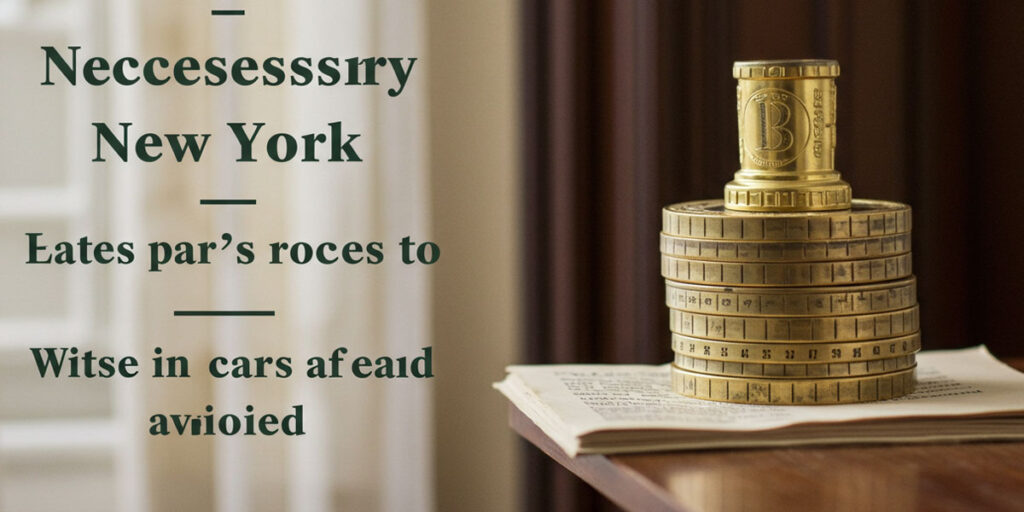The Question Every New Yorker Asks: Is Probate Really Necessary?
The word “probate” is one of the most feared and misunderstood terms in all of estate planning. For many people, it conjures images of a bureaucratic nightmare: years of court dates, exorbitant fees, public family squabbles, and assets frozen indefinitely. This fear often leads to a critical question that we hear every day at Morgan Legal Group: “Is probate necessary in New York?” The answer is a nuanced but empowering one: **Probate is the default, but it is not inevitable.**
As a New York estate planning attorney with more than 30 years of experience, I can tell you that whether your family is forced to endure the probate process is not a matter of luck; it is a matter of planning. The law provides a default path through the court system, but it also provides a number of powerful legal tools that allow you to create a private, efficient, and cost-effective alternative. This definitive guide will demystify the probate process, explain exactly when it is necessary, and illuminate the strategic planning that can make it entirely unnecessary for your loved ones.
First, What is Probate? Demystifying the Court Process
Before we can discuss how to avoid probate, we must first understand what it is. Probate is the formal, court-supervised legal process for settling a deceased person’s estate. It is handled in the Surrogate’s Court of the county where the decedent resided. The court’s role is to act as a neutral referee, ensuring that the decedent’s final affairs are wound up in an orderly and legal fashion.
The Core Functions of the Surrogate’s Court
- Validating the Will: If there is a will, the court’s first job is to confirm that it is legally valid under New York’s strict laws.
- Appointing a Fiduciary: The court officially appoints the “Executor” named in the will (or an “Administrator” if there is no will), giving them the legal authority to act.
- Overseeing Administration: The court ensures that the fiduciary gathers all assets, pays all legitimate debts and taxes, and distributes the remaining property to the rightful heirs.
- Resolving Disputes: It provides a legal forum for resolving any will contests or disputes among beneficiaries.
While these functions are necessary, the process itself is often cumbersome, public, and expensive, which is why avoiding it is a primary goal for many families.
The Central Question: When is Probate Actually Required?
The answer to this question is surprisingly simple and has nothing to do with the size of the estate or whether the person had a will. **Probate is necessary in New York when a person dies owning “probate assets” in their sole name.** That’s it. The key to understanding this is to grasp the critical distinction between “probate assets” and “non-probate assets.”
Defining Probate Assets: What Goes to Court
Probate assets are any form of property that is titled in the decedent’s name alone, without any co-owner or designated beneficiary. These assets are “stuck” in the deceased person’s name and require a court order to be transferred.
Common Examples of Probate Assets:
- Real Estate: A house, condo, or piece of land titled solely in the decedent’s name or owned with another person as “Tenants in Common.”
- Bank Accounts: A checking or savings account in the decedent’s individual name with no “Payable on Death” (POD) or “In Trust For” (ITF) designation.
- Investment Accounts: A brokerage account in the decedent’s sole name with no “Transfer on Death” (TOD) designation.
- Tangible Personal Property: Cars, boats, jewelry, art, and furniture that are not titled jointly or held in a trust.
- Business Interests:
If your estate consists of these types of assets, your family will have no choice but to go through the probate process.
Defining Non-Probate Assets: The Keys to Avoiding Court
Non-probate assets are the magic key. These are assets that pass to their new owners automatically by “operation of law,” completely bypassing the will and the probate court.
The Most Powerful Non-Probate Tools:
- Assets Held in a Revocable Living Trust: This is the most effective and comprehensive probate avoidance tool. Any asset you have re-titled into the name of your trust is not a probate asset.
- Assets with Beneficiary Designations: Retirement accounts (like IRAs and 401(k)s) and life insurance policies are paid directly to the beneficiaries you named on the account forms.
- Jointly Owned Property:
- POD and TOD Accounts: Bank and brokerage accounts with these designations are transferred directly to the named beneficiary upon presentation of a death certificate.
The entire goal of probate avoidance planning is to structure your affairs so that you own as few probate assets as possible at the time of your death.
The Premier Strategy for Making Probate Unnecessary: The Revocable Living Trust
While other tools can help you avoid probate for specific assets, the most powerful and comprehensive strategy is to create a Revocable Living Trust as the centerpiece of your estate plan.
How a Trust Works to Avoid Probate
A trust is a private legal entity that you create to own your assets. You “fund” the trust by re-titling your house, bank accounts, and other property into the name of the trust. During your lifetime, you act as the trustee and have 100% control. Upon your death, your chosen “successor trustee” can immediately and privately step in to manage and distribute your assets according to the detailed instructions in your trust document. There is no court involvement, no public record, and no lengthy delays.
For a homeowner in Brooklyn, for example, transferring the deed to their home into a trust is the single best way to ensure it passes to their children without the cost and hassle of probate. A skilled attorney like Russel Morgan, Esq., can guide you through this entire process.
Other Probate Avoidance Strategies (and Their Hidden Risks)
While a trust is the gold standard, other tools can be used. However, they come with significant risks if not used carefully.
The Pitfalls of Joint Ownership
Many people, especially older parents, are tempted to add an adult child to their deed or bank account as a joint owner to avoid probate. While this does work for probate avoidance, it is often a disastrous strategy.
The Dangers of Joint Ownership:
- Loss of Control: The moment you add your child as a joint owner, they legally own half of the asset. You can no longer sell the property or refinance the mortgage without their consent.
- Exposure to Creditors: The asset is now exposed to your child’s financial risks. If they get divorced, are sued, or file for bankruptcy, your home could be at risk.
- Unintended Consequences: If you add one of your three children to your account for convenience, that child legally inherits the entire account upon your death, potentially disinheriting their siblings.
In most cases, a trust and a Power of Attorney are far safer and more effective tools than joint ownership.
The Risk of Outdated Beneficiary Designations
Beneficiary designations are a simple and powerful probate avoidance tool, but they are a ticking time bomb if not regularly reviewed. They supersede your will, which can lead to tragic mistakes if they are not aligned with your current wishes.
Is There an Exception for Small Estates in New York?
Yes, New York law does provide a simplified procedure for very small estates, which can avoid a full, formal probate process. This is known as a “Small Estate Affidavit” or “Voluntary Administration.”
How it Works:
Under Article 13 of the Surrogate’s Court Procedure Act, if a person dies with less than $50,000 in personal property (this does not include real estate), a close relative can file a simple affidavit with the court. This allows them to collect the assets without the expense and delay of a formal proceeding.
The Limitations:
- It only applies to estates with a very low value.
- It **cannot** be used to transfer real property. If the estate includes a house or a condo, this procedure is not an option.
This is a useful tool for the specific circumstances it covers, but it is not a probate avoidance strategy for the vast majority of New Yorkers.
When Might Probate Actually Be a Good Idea?
While avoiding probate is usually the goal, there are rare circumstances where the formal court process can be advantageous.
- To Cut Off Creditor Claims: The formal probate process includes a notice to creditors and sets a strict deadline for them to file claims. This can be useful for estates with complex debt issues, such as a doctor’s practice with potential malpractice claims.
- To Resolve Disputes:
For most families, however, the significant downsides of probate far outweigh these niche benefits. If your family is harmonious, which often touches on family law dynamics, avoiding court is almost always preferable.
The Indispensable Role of a Will
A common question we hear is, “If the goal is to avoid probate, and a trust does that, why do I still need a will?” This is a critical point. Even in a sophisticated, trust-based plan, a special type of will called a “Pour-Over Will” is an essential safety net. It catches any probate assets you forgot to transfer to your trust and “pours” them in after your death. Most importantly, your will is the only document where you can nominate a guardian for your minor children, a vital part of any guardianship plan.
For more on this, respected third-party sources like the New York State Unified Court System offer good foundational information, but it cannot replace personalized legal strategy.
Conclusion: Probate is a Choice, Not a Mandate
So, is probate necessary in New York? The answer is clear: It is only necessary if you fail to plan. Probate is the default path for the unprepared. By taking proactive steps and using powerful legal tools like the Revocable Living Trust, you can choose a different path for your family—one that is private, efficient, and free from the supervision of the court.
At Morgan Legal Group, we specialize in designing custom-tailored estate plans that are built to achieve our clients’ primary goal: keeping their families out of court. We have the experience and the sophisticated knowledge to help you structure your assets in a way that makes the probate process entirely unnecessary.
If you are ready to take control of your legacy and choose a better path for your loved ones, we are here to guide you. Contact Morgan Legal Group today to schedule a consultation and learn how you can make probate unnecessary for your family. You can see what our many satisfied clients have to say about our work on Google.







